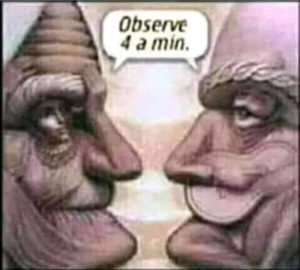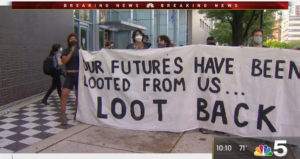In
Part II, we unpacked how this pandemic may be exposing our financial strongholds. Today, as we are all dealing with pain, loss, grief, and suffering we explore from a new vantage point how our beliefs about the poor and food insecurities can become a stronghold. The apostle Paul defines strongholds as “speculations or lofty things raised against the knowledge of God. It is any type of thinking that exalts itself above the knowledge of God, thereby giving the devil a secure place of influence in an individual”.
Again, and again, individuals and communities have demonstrated that the worst situations tend to bring out the best in people. In every moment of darkness, there are countless moments of small gestures of compassion and connection that allow people to show who they are, how they want to live, and what matters to them. Shawn Donnan and Reade Pickert reported, “just a four-minute drive across the lagoon from Mar-a-Lago, President Donald Trump’s private club, and ten minutes from the Palm Beach outposts of Chanel and Louis Vuitton, Howley’s diner has become an emblem of America’s stark new economic reality. The kitchen staff at Howley’s has been cooking up free meals for thousands of laid-off workers from Palm Beach’s shuttered restaurants and resorts. The rows of brown-bag lunches and dinners are an early warning that the country’s income gap is about to be wrenched wider as a result of the COVID-19 crisis, and the deep recession it has brought with it. Palm Beach is one of the richest counties in the country.
Even as much of America is fretting about supermarket shelves depleted of their favorite cereal brands and toilet paper or the logistics of curbside pickup from favorite restaurants, a brutal new hunger crisis is emerging among laid-off workers that has begun to overwhelm the infrastructure that normally takes care of the needy.”
Unfortunately, a large portion of the middle class are now experiencing the long food lines; and its not the grocery store lines. They are in food distribution lines faced with a predetermined choice, long waits, and the shame of having to depend on someone else for sustenance. These people aren’t lazy, on drugs or unmotivated. Circumstances have created havoc in people’s lives, yet it’s easy to understand their plight. They are our neighbors; they are just like us. We should be willing to assist them.
Donnan and Pickert further presented, “The surge in demand is not just in Palm Beach. Food banks have recorded increases in requests for assistance as government-ordered lockdowns have started to bite, prompting employers to lay off staff. Food insecurity was already a chronic problem in many U.S. communities. Across the U.S. 14.3 million households were short of food in 2018.”
Everyday life has become a struggle — not just finding food, clothes, or diapers, but finding the money to pay for them. The pre-existing problem of food insecurity is exploding as more and more without work have come to depend on various types of support organizations.
A second wave of job loss is hitting those who thought they were safe. The middle class is, or are, a few months away from becoming part of this group mostly defined as “the poor”.
Our guest speaker, Jeremy Everett wrote in the Dallas Morning News, “Too many of our views about the causes of hunger in our nation are made up of one anecdotal experience, Facebook posts, or our favorite news source. Rarely are our opinions informed by actual research, a comprehensive biblical view, or proximity to the problem.
“In Matthew 25, Jesus lays out our responsibility: “For I was hungry and you gave me food, I was thirsty and you gave me something to drink, I was a stranger and you welcomed me, I was naked and you gave me clothing, I was sick and you took care of me, I was in prison and you visited me.”
Here, what matters is whether a person has acted with love and cared for the needy. These acts are not just “extra credit” but constitute the decisive criterion for judgment. The calling of the faithful is clear: Feed the hungry and you will live. Unfortunately, we have scapegoated the poor to justify not living up to our calling. To scapegoat and push the poor out of our minds, we’ve had to dehumanize them. We have worked hard to classify the poor as lazy, to divide them as deserving and undeserving. We have developed theologies of prosperity to lift those who are rich in order to demonize those who are poor.
Thus, we’ve decided that it is morally defensible for some children to have an abundance of food while others have nothing in the fridge. We can just blame the parent for being lazy or entitled. This is antithetical to the Scripture we read in Matthew. After all, the accused in Matthew are the ones that did not see the hungry and give them food. The ones that did not provide shelter for the stranger. Instead, Matthew calls us to not only see the hungry as humans, but to see them as Jesus.”
Maybe. . . just maybe this is an opportunity for everyone to gain an understanding, through a lived experience, the struggle to acquire food when things are out of your control. Maybe. . . just maybe we are experiencing a season of great spiritual awakening. Maybe. . . just maybe this is a chance to see the poor as Jesus sees them. Maybe. . . just maybe we will have a little more compassion for the least, the lost and the last. Maybe. . . just maybe if we can come up with $2 Trillion in welfare to rescue those we can justify as in need; our view of justification can become Biblical for those we can’t justify due to our strongholds of thinking of our self more highly than we ought. In an effort to keep me humble my mother use to always say, “There, but for the grace of God, go I”.
God, we need You. Oh how we need You. You are our first defense, our righteousness. Our lives have been turned upside down and we search for answers. At times we lose our way and forget that You asked us to think of others more highly than we do of ourselves. Break strongholds in our lives. Help us to be examples of You to a wondering world.
In Jesus name we pray. Amen
Would your connections benefit from this post?





